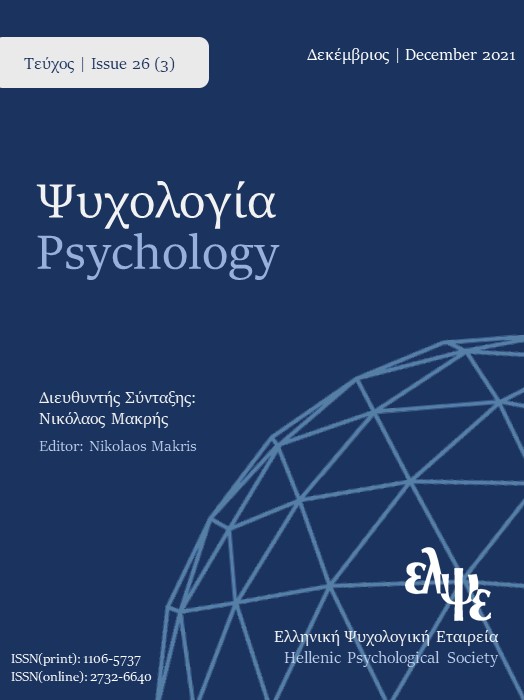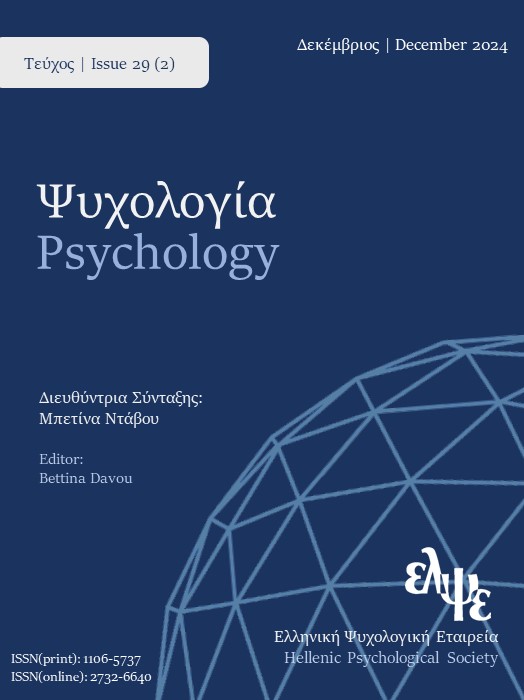Αυταρχισμός, προκατάληψη και COVID-19: ο ρυθμιστικός ρόλος του πολιτισμικού φιλελευθερισμού

Περίληψη
Η πανδημία COVID-19 έχει θέσει μια τεράστια πρόκληση σε ιατρικό, οικονομικό και πολιτικό επίπεδο τους τελευταίους μήνες. Η απειλή της ασθένειας, οι περισσότερο ή λιγότερο αυταρχικές βιοπολιτικές των κρατών, η έννοια της κοινωνικής απόστασης, υπαγορεύουν τη διερεύνηση των συνεπειών της πανδημίας σε ιδεολογικό επίπεδο. Χρησιμοποιώντας τα δεδομένα που προέκυψαν από μια έρευνα που διεξήχθη πριν την πανδημία (N = 82) ως σημείο αναφοράς, ο στόχος της παρούσας μελέτης ήταν να ελέγξει εμπειρικά την υπόθεση ότι ο δεξιόστροφος αυταρχισμός (Αυταρχισμός - Συντηρητισμός - Παραδοσιακρατία; ACT; Duckitt et al., 2010) αυξάνεται υπό συνθήκες απειλής (Adorno et al., 1950; Sales, 1973). Παράλληλα, διερευνάται ο πιθανός ρυθμιστικός ρόλος του πολιτισμικού φιλελευθερισμού. Επιπλέον, εξετάζεται η υπόθεση ότι η απειλή προβλέπει την προκατάληψη, όπως μας υποδεικνύουν σχετικά ευρήματα (π.χ. Florack et al., 2003). Πραγματοποιήθηκε συλλογή δεδομένων κατά τις εξής τρεις φάσεις της πανδημίας στην Ελλάδα: τις πρώτες εβδομάδες (N = 85), την απαγόρευση κυκλοφορίας (N = 131) και την άρση των περιοριστικών μέτρων (N = 126). Οι υποθέσεις επιβεβαιώθηκαν: υπήρξε αύξηση του Συντηρητισμού και της Παραδοσιοκρατίας, ιδίως μεταξύ των λιγότερο φιλελεύθερων συμμετεχόντων, ενώ οι φιλελεύθεροι φαίνεται να εκφράζουν μειωμένα επίπεδα δεξιόστροφου αυταρχισμού κατά την άρση των περιοριστικών μέτρων σε σύγκριση με την προ COVID-19 περίοδο. Βρέθηκε, επίσης, μια βαθμιαία έκφραση προκατάληψης, με τον πολιτισμικό φιλελευθερισμό να παίζει έναν περιορισμένο, αλλά και πάλι ρυθμιστικό ρόλο. Συζητούνται οι επιπτώσεις της πανδημίας στο ιδεολογικό επίπεδο.
Λεπτομέρειες άρθρου
- Πώς να δημιουργήσετε Αναφορές
-
Valavani, A., & Prodromitis, G. (2021). Αυταρχισμός, προκατάληψη και COVID-19: ο ρυθμιστικός ρόλος του πολιτισμικού φιλελευθερισμού. Ψυχολογία: το περιοδικό της Ελληνικής Ψυχολογικής Εταιρείας, 26(3), 62–77. https://doi.org/10.12681/psy_hps.28863
- Ενότητα
- ΕΙΔΙΚΟ ΑΦΙΕΡΩΜΑ

Αυτή η εργασία είναι αδειοδοτημένη υπό το Creative Commons Attribution-ShareAlike 4.0 International License.
Το περιοδικό ΨΥΧΟΛΟΓΙΑ έχει υιοθετήσει μία πολιτική Platinum open-access. Τα έξοδα υποβολής, επεξεργασίας ή δημοσίευσης των εργασιών καλύπτονται από την Ελληνική Ψυχολογική Εταιρεία. Τα πνευματικά δικαιώματα των δημοσιευμένων εργασιών προστατεύονται από την άδεια 'Creative Commons Attribution-ShareAlike 4.0 International'. Οι Συγγραφείς διατηρούν τα Πνευματικά Δικαιώματα και χορηγούν στο περιοδικό το δικαίωμα της πρώτης δημοσίευσης. Η άδεια αυτή επιτρέπει σε τρίτους, να χρησιμοποιούν την εργασία σε οποιαδήποτε μορφή, με την προϋπόθεση της διατήρησης των διατυπώσεων που προβλέπονται στην άδεια σχετικά με την αναφορά στον αρχικό δημιουργό και την αρχική δημοσίευση στο περιοδικό ΨΥΧΟΛΟΓΙΑ. Επιπλέον, κάθε διανομή της εργασίας οφείλει να γίνεται με τους ίδιους όρους διανομής, δηλαδή με την ίδια άδεια Creative Commons.



